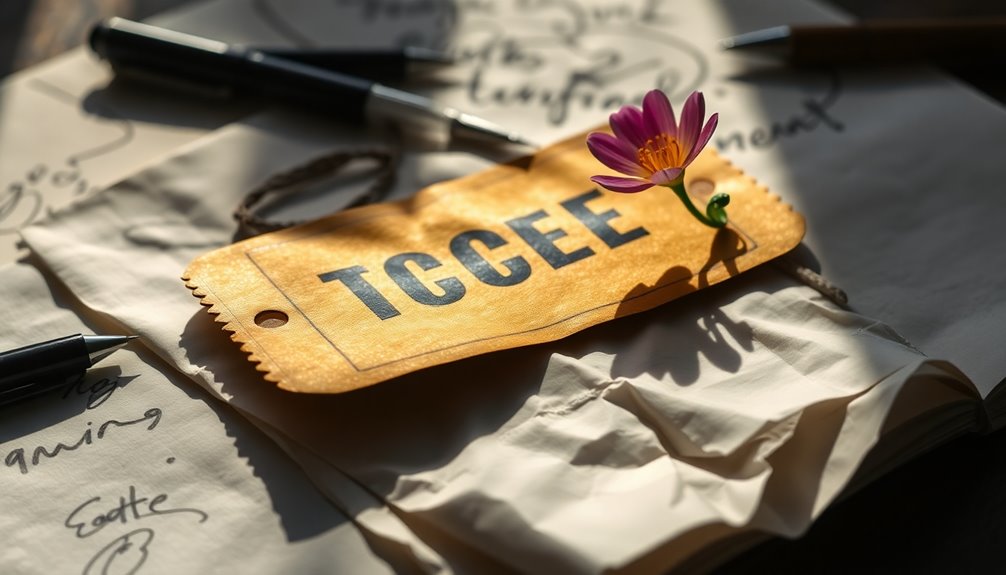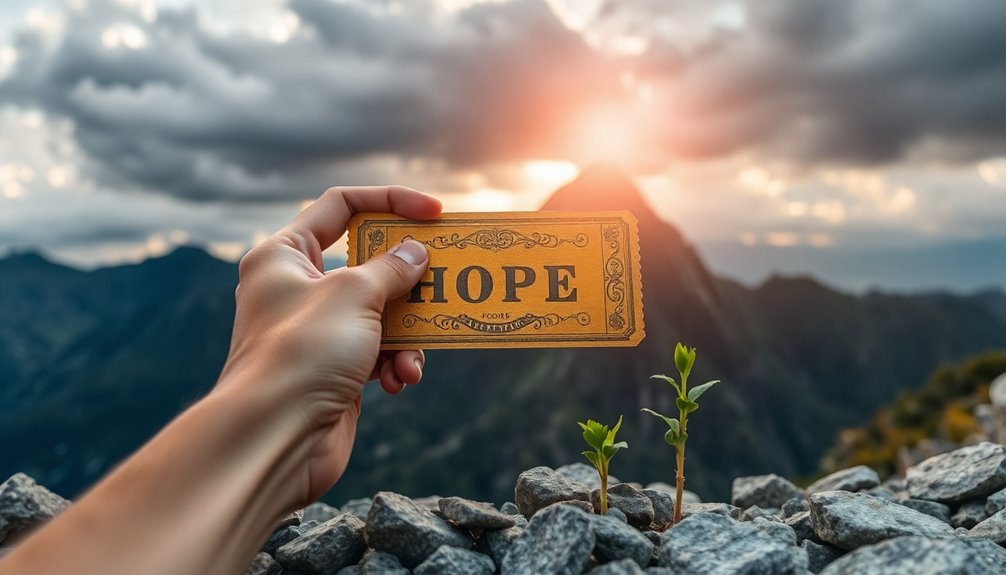Your strengths and weaknesses are your golden ticket to success. By embracing your unique strengths, you boost your confidence and engagement. Don't shy away from your weaknesses; acknowledge them and turn them into opportunities for growth. Practice mindful experimentation to refine your skills and develop high-performance habits that foster resilience. Building a strong support network can further propel your journey. Set measurable goals and remain open to feedback, viewing it as a tool for improvement. Discover how transforming your challenges can lead you to greater fulfillment and reveal your full potential—there's even more to explore on this transformative path!
Key Takeaways
- Identify and embrace your core strengths to build confidence and enhance engagement in your work.
- Acknowledge weaknesses as opportunities for growth and develop actionable strategies to address them.
- Set specific, measurable goals to track progress and maintain motivation in your personal development journey.
- Seek constructive feedback to gain insights into areas for improvement and refine your personal brand.
- Engage in mindful experimentation and reflective practices to foster resilience and adaptability in facing challenges.
Embracing Your Unique Strengths

Embracing your unique strengths is the key to releasing your full potential and achieving greater career satisfaction. When you identify your core competencies, you not only boost your confidence but also set the stage for success in your professional life. Research shows that individuals who focus on their strengths are 30% more engaged in their work. This engagement translates directly into increased productivity and job performance, making it essential to understand what makes you stand out.
Recognizing your unique strengths can help you cultivate a personal brand that attracts potential employers and clients. In today's competitive job market, showcasing your strengths can give you a significant edge. Studies indicate that emphasizing strengths rather than weaknesses can lead to a 12% increase in overall performance, proving that strength-based development strategies are effective.
To harness your unique strengths, incorporate regular self-reflection and seek feedback from peers. These practices enable you to recognize and nurture your talents, leading to a more fulfilling and purpose-driven life. So, take the time to embrace your unique strengths, and watch as they release opportunities for growth and success. Additionally, consider participating in Speakers Boot Camp to enhance your public speaking skills, which can further amplify your strengths and create more opportunities.
Acknowledging and Addressing Weaknesses

To grow, you need to embrace vulnerability by acknowledging your weaknesses. Identifying areas for improvement is essential, as it sets the foundation for developing actionable strategies that lead to personal and professional success. By facing these challenges head-on, you open the door to transformative growth. Additionally, recognizing your core issues can significantly enhance your journey toward self-improvement and resilience.
Embrace Vulnerability for Growth
Vulnerability is a powerful catalyst for personal growth, allowing you to confront and acknowledge your weaknesses. By embracing vulnerability, you open the door to self-awareness, enabling you to understand your limitations better. This awareness is essential for developing a growth mindset, which fosters resilience and adaptability in the face of challenges.
When you express vulnerability, you not only show authenticity but also build trust with others. This openness encourages deeper connections and can lead to increased support and empathy from those around you. In a nurturing environment, you'll feel more comfortable addressing your weaknesses, transforming them into opportunities for growth.
Moreover, discussing your vulnerabilities can help you gain insights into your strengths. Instead of viewing shortcomings as failures, consider them stepping stones toward reaching your full potential. Acknowledging your weaknesses can empower you to set personal goals that align with your values and aspirations.
In essence, embracing vulnerability isn't a sign of weakness; it's a conscious choice that fuels your journey toward self-improvement. By recognizing and addressing your vulnerabilities, you create a pathway to success—the golden ticket you've been seeking. Understanding that narcissistic relationships can distort perceptions of self-worth can also aid in this transformative process.
Identify Areas for Improvement
Identifying areas for improvement is essential for personal development and can greatly enhance your journey toward success. Recognizing your weaknesses isn't a setback; it's an opportunity. By embracing self-reflection and seeking feedback from peers, you can pinpoint what needs attention. Remember, those who actively pursue feedback tend to experience greater success in both personal and professional domains.
To effectively identify your areas for improvement, consider the following:
- Embrace a growth mindset, viewing challenges as learning opportunities.
- Regularly seek constructive feedback to gain insights into your weaknesses.
- Set specific, measurable goals to enhance focus and motivation.
- Engage in continuous learning through workshops, courses, or mentorship.
- Reflect on past experiences to identify patterns of behavior that need adjustment. Additionally, recognizing your weaknesses can lead to building resilience and ultimately contribute to greater personal growth.
Develop Actionable Strategies
Acknowledging your weaknesses is essential for personal growth, and developing actionable strategies to address them can greatly enhance your journey. Start by embracing a growth mindset, viewing your weaknesses as opportunities to learn new things. This perspective fosters resilience and adaptability, crucial traits when facing challenges.
Next, set specific, measurable goals for improvement. By creating a clear pathway, you can track your progress and keep yourself accountable. Regular assessments will motivate you and highlight the lessons you learned along the way. Don't hesitate to seek feedback from peers or mentors – their insights can be invaluable. Constructive criticism helps create a collaborative environment where you can thrive.
Consider engaging in targeted skill development through workshops, courses, or coaching. These resources not only help you transform weaknesses into strengths but also enhance your overall performance and confidence. As you grow, remember to give back to others by sharing your experiences and knowledge. This not only reinforces your own learning but also contributes to a supportive community. By actively addressing your weaknesses, you're not just improving yourself; you're paving the way for others to do the same. Additionally, understanding the importance of quality assurance in software development can further emphasize the critical nature of addressing weaknesses in your skill set.
The Power of Mindful Experimentation

Mindful experimentation is your gateway to self-discovery, allowing you to try new activities and reflect on what you learn. By embracing this journey, you cultivate a growth mindset that helps you adapt and thrive in changing circumstances. Regularly experimenting and reflecting not only uncovers your unique strengths but also highlights areas where you can improve. Moreover, fostering emotional intelligence through mindful experimentation enhances your interpersonal relationships and decision-making abilities.
Embrace Self-Discovery Journey
Through the practice of experimentation, you can commence on a transformative self-discovery journey that reveals your unique strengths and weaknesses. This journey acts as your Golden Ticket, revealing insights that can help you contribute positively back to your community. By engaging in mindful experimentation, you not only explore but also refine your personal identity.
- Self-questioning enhances clarity about your values and goals.
- Regular reflection helps you identify patterns and insights.
- Embracing feedback from peers offers new perspectives.
- Self-monitoring allows you to assess your happiness levels.
- Adapting your actions aligns you with your true purpose.
As you venture through this process, think of it as baking COOKIES—each ingredient (experience) adds flavor to the final product (you). The more you experiment, the better you understand what works for you. You're not just learning; you're evolving. Embrace the feedback, reflect on your experiences, and watch how these steps lead to personal growth and fulfillment. This self-discovery journey isn't just about finding your strengths; it's about crafting a life that resonates deeply with who you are.
Additionally, incorporating techniques like visualization techniques can further enhance your journey of self-discovery and personal alignment.
Cultivate Growth Mindset
Cultivating a growth mindset can transform how you approach challenges and opportunities in life. Instead of seeing obstacles as roadblocks, you'll begin to view them as stepping stones for personal development. This shift fosters resilience and adaptability, essential traits in today's fast-paced world.
Mindful experimentation plays a significant role in nurturing this mindset. Actively seeking feedback and reflecting on experiences allows you to identify strengths and address weaknesses. Research shows that individuals with a growth mindset are 34% more likely to embrace challenges and persist through difficulties. This persistence often leads to better performance and outcomes. Additionally, incorporating hydration for cognitive function can further enhance your mental clarity and decision-making abilities.
To help you on this journey, consider the following table:
| Aspect | Fixed Mindset | Growth Mindset |
|---|---|---|
| Challenges | Avoids them | Embraces them as opportunities |
| Feedback | Sees it as criticism | Views it as a tool for growth |
| Effort | Believes it's fruitless | Understands it's key to mastery |
Engaging in self-questioning about your happiness levels can further enhance your growth mindset, refining your goals and strategies for personal development.
Experiment and Reflect Regularly
Experimentation is like a compass guiding you through the uncharted waters of personal growth. By engaging in mindful experimentation, you actively try new approaches and reflect on the outcomes. This process enhances your self-awareness and helps pinpoint your strengths and weaknesses. Regular self-questioning is essential; it leads to more effective experimentation and targeted improvements.
Consider these key benefits of experimenting regularly:
- Adaptability: Diverse experiences build resilience, turning challenges into opportunities.
- Accountability: Tracking progress fosters clarity in both personal and professional journeys.
- Feedback: Incorporating insights from trusted sources reveals blind spots and accelerates your learning.
- Growth Mindset: Embracing a willingness to try new things cultivates a mindset focused on growth.
- Reflection: Taking time to reflect on your experiments deepens your understanding of yourself. Additionally, regular experimentation can enhance your ability to manifest desires, aligning with the principles of the Law of Attraction.
Cultivating High-Performance Habits

High-performance habits are essential for anyone looking to enhance their personal and professional life. By cultivating these habits, you'll gain clarity about your values and goals, which leads to a more intentional and engaged existence. Generating energy through physical and mental stamina helps you maintain focus and productivity in your daily tasks. Additionally, embracing the concept of continuous learning can significantly contribute to your personal development journey.
To foster these habits, consider the following strategies:
| Habit | Action Steps | Benefits |
|---|---|---|
| Seek Clarity | Write down your values and goals. | Enhanced focus and intention. |
| Generate Energy | Exercise regularly and meditate. | Improved stamina and focus. |
| Raise Necessity | Set deadlines and hold yourself accountable. | Increased urgency to act. |
| Increase Productivity | Remove distractions and prioritize tasks. | Better quality output. |
| Develop Influence | Network and build supportive relationships. | Enhanced collaboration. |
Incorporating these high-performance habits into your routine can greatly elevate your effectiveness. You'll not only achieve more but also enjoy the journey, making each day more fulfilling. Start small and gradually build these habits into your life for lasting change.
Building Resilience Through Challenges

Facing challenges is an inevitable part of life, and how you respond can shape your resilience. When you recognize your strengths and weaknesses, you lay the groundwork for personal growth and adaptability. Embracing challenges as opportunities for learning can greatly enhance your mental well-being.
To build resilience effectively, consider these strategies:
- Practice mindfulness: It reduces stress and increases emotional regulation, allowing you to respond better to adversity.
- Seek social support: Surround yourself with positive relationships that provide encouragement and resources when times get tough.
- Engage in reflective practices: Journaling or self-assessment can help you identify coping strategies and strengths that empower you.
- Reframe challenges: Change your perspective to see obstacles as stepping stones toward growth rather than insurmountable barriers.
- Set small goals: Break down larger challenges into manageable steps to maintain motivation and a sense of achievement.
Creating Meaningful Connections

Building resilience through challenges not only strengthens your character but also sets the stage for creating meaningful connections. To cultivate these connections, focus on trust and mutual respect, as they're essential for both personal and professional growth. Engage in active listening and open communication; this approach fosters a deeper understanding of others and enhances the quality of your relationships.
In your 20s, take advantage of networking opportunities. They can lead to valuable mentorships that contribute greatly to your career and personal development. Don't underestimate the power of volunteering and community involvement. These activities not only enrich your life but also help you build a supportive network that opens doors to new opportunities.
Creating relationships through shared experiences and genuine interactions is key. This not only enhances your individual growth but also strengthens the collective resilience of your community. As you navigate challenges, these meaningful connections will provide the support and encouragement you need. Remember, every connection you make can become a stepping stone toward your goals, transforming your strengths and weaknesses into a golden ticket for success.
Frequently Asked Questions
How Can I Identify My Personal Strengths Effectively?
To identify your personal strengths effectively, start by reflecting on past achievements and moments when you felt proud. Ask friends or colleagues for feedback about what they see as your strengths. Consider taking assessments or quizzes designed to uncover personal traits. Keep a journal to track tasks you enjoy and excel at. By actively engaging in self-reflection and seeking input, you'll gain a clearer picture of what you do best.
What Steps Should I Take to Address My Weaknesses?
To address your weaknesses, start by acknowledging them honestly. List them out and prioritize which ones you'd like to improve first. Seek feedback from trusted friends or mentors to gain perspective. Set specific, achievable goals for each weakness, and create a plan to tackle them, whether through practice, education, or mentorship. Finally, track your progress and celebrate small victories—this'll keep you motivated and help you grow over time.
Can Strengths and Weaknesses Change Over Time?
You might think strengths and weaknesses are set in stone, but they can definitely change over time. As you gain experiences, learn new skills, or face different challenges, your abilities can evolve. For instance, you might discover a talent for public speaking after years of avoidance. Embracing growth and being open to feedback can help you transform both your strengths and weaknesses, allowing you to adapt to new situations and opportunities.
How Do I Measure My Personal Growth?
To measure your personal growth, start by setting clear goals and tracking your progress. Reflect regularly on your achievements and challenges, noting how you've overcome obstacles. Journaling can help you see patterns and changes over time. Seek feedback from others to gain perspective on your growth. Finally, celebrate your milestones, no matter how small, as they're all part of your journey towards becoming the best version of yourself.
What Role Does Feedback Play in This Process?
Feedback's like a guiding star on your journey of personal growth. It helps you see blind spots and highlights areas where you shine. When you embrace constructive criticism, you're not just collecting opinions; you're opening doors to improvement. Listening to others' perspectives can spark new ideas and motivate you to keep pushing forward. Remember, growth isn't just about celebrating wins; it's about learning from every experience, even the tough ones.
Conclusion
In the journey of personal growth, your strengths are the wind in your sails, propelling you forward, while your weaknesses are the waves that challenge your course. By embracing both, you can navigate through life's storms and reach new horizons. Mindful experimentation and resilience will transform these elements into a golden ticket for success. So, harness your unique qualities, face your challenges head-on, and watch as you create meaningful connections that enrich your voyage.
Felicity, our Author, pens in-depth articles and guides that delve into the heart of personal discovery. Her narrative-driven approach weaves together theory, practice, and personal anecdotes, making the journey of self-exploration both relatable and inspiring. Felicity’s contributions help illuminate the path for those seeking a deeper understanding of themselves and their relationships.










